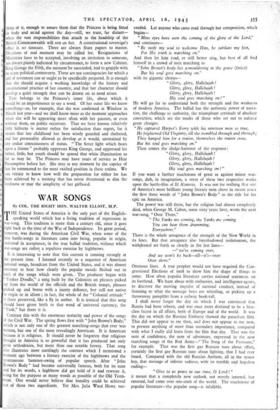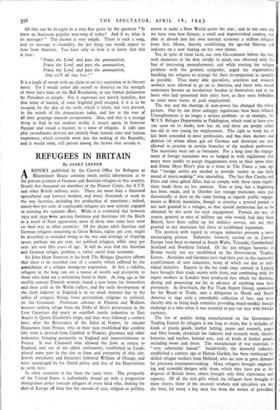WAR SONGS
By COL. THE RIGHT HON. WALTER ELLIOT, M.P.
THE United States of America is the only part of the English- speaking world which has a living tradition of expression in war-song. This tradition is more than a century old, since it goes right back to the titni of the War of Independence. Its great period, however, was during the American Civil War, when some of the best battle-songs in literature came into being, popular in origin, universal in acceptance, in the true ballad tradition, without which war-songs are rather a repulsive exercise by highbrows.
It is interesting to note that this current is running strongly at the present time. I listened recently to a sequence of American national songs, broadcast from the United States, and it was almost uncanny to hear how clearly the popular moods flashed out in each of the songs which were given... The producer began with " Yankee Doodle," a song built by the Colonists on phrases picked up from the world of the officials and the British troops, phrases picked up and borne with a jaunty defiance, but still not native in origin or in idiom ; in fact, the whole of the " Colonial attitude " is there preserved, like a fly in amber. It is ironical that this song should have given birth to that word of 'universal currency, the " Yank," but there it is.
Contrast this with the enormous maturity and power of the songs of the Civil War. The spring flows first with " John Brown's Body," which is not only one of the greatest marching-songs that ever was written, but one of the most revealingly American. It is American because it is religious. It should never be forgotten that religious thought in America is so powerful that it has produced not only great orthodoxies, but more than one notable heresy. That song also illustrates most startlingly the contrast which I mentioned a moment ago between a literary exercise of the highbrows and the spontaneous hammer-swing of popular speech. After " John Brown's Body" had become universally famous, both for its tune and for its words, a highbrow did get hold of it and rewrote it, using for the purpose as many words as possible of the Old Testa- em. One would never believe that banality could be achieved out of these two ingredients. Yet Mrs. Julia Ward Howe suc- ceeded. Let anyone who cares read through her composition, which begins—
"Mine eyes have seen the coming of the glory of the Lord," and continues-
" Be swift my soul to welcome Him, be jubilant my feet, For His truth is marching on."
And then let him read, or still better sing, but best of all find himself in a crowd of men marching to
"John Brown's body lies a-mouldering in the grave (thrice) But his soul goes marching on."
with its gigantic chorus- " Glory, glory, Hallelujah !
Glory, glory, Hallelujah !
Glory, glory, Hallelujah !
His soul goes marching on ! "
He will go far to understand both the strength and the weakness of modern America. The ballad has the authentic power of narra- tive, the challenge to authority, the triumphant certitude of absolute conviction, which are the marks of those who set out to enforce great changes.
"He captured Harper's Ferry with his nineteen men so true, He frightened Old Virginny, till she trembled through and through; They hanged him for a traitor, themselves the traitor crew, But his soul goes marching on."
Then comes the sledge-hammer of the response :
" Glory, glory, Hallelujah !
Glory, glory, Hallelujah !
Glory, glory, Hallelujah !
His soul goes marching on ! "
If you want a further touchstone of great as against minor war- songs, dub, in imagination, a verse of these two respective works upon the battle-film of El Alamein. It was not for nothing that of America's most brilliant young literary men chose in recent years the first three words of " John Brown's Body " as the title for his epic on America.
The power was still there, but the religion had almost completely died, when George M. Cohan, some sixty'years later, wrote the next war-song, " Over There."
" The Yanks are coming, the Yanks are coming You can hear them drumming, Everywhere."
There.is the whole arrogance of the strength of the New World in its lines. But that arrogance also foreshadowed isolationism, the withdrawal set -forth so clearly in the last lines-
-" we're coming over,
And we won't be back—till—it's—over Over there."
Ominous lines. A true prophet would not have required the Con- gressional Elections of 1918 to show him the shape of things to come. How often popular literature carries national sentiment on its forehead. We hunt about with embassies, and intelligence agents, to discover the moving impulse of national conduct, instead of listening to' what the message boys are whistling, or picking up a throwaway pamphlet from a railway bookstall.
I shall never forget the day on which I was convinced that Russia had been reborn, and was once more destined to be a first- class factor in all affairs, both of Europe and of the world. It was the day on which the Russian Embassy showed the parachute film. This did not appear to me then, and does not appear to me now, to present anything of more than secondary importance, compared with what I really did- learn from the film that day. That was the note of confidence, the note of adventure, expressed in the new marching songs of the Red Army—" The Song of the Partisans," for example. That was the first gay Russian tune about effort, certainly the first gay Russian tune about fighting, that I had ever heard. Compared with the old Russian Anthem, all in the minor key, that message of infinite sadness, with its terrible and hopeless ending- " Give to us peace in our time, 0 Lord I " it meant that a completely new outlook, not merely internal, but external, had come over one-sixth of the world. The touchstone of popular literature—the popular song—is infallible. All this can be brought to a very fine point by the question " Is there an American popular war-song of today? And if so, what is its message? " The answer is very simple. There is such a song, and its message is—humility, the last thing one would expect to hear from America. You have only to hear it to know that this is true:
"Praise the Lord, and pass the ammunition, Praise the Lord, and pass the ammunition, Praise the Lord, and pass the ammunition, And we'll all stay free ! "
It is a jingle of words with no claim to art:st. c aspiration or to literary merit. Yet I would rather ally myself to America on the strength of these lines than on the Ball Resolution, or any formal declaration by President or people. For it expresses not merely humility, but that sense of hazard, of some frightful peril escaped, if it is to be escaped, by the skin of the teeth, which is latent, but very present, in the minds' of the democracies today, and lies at the root of all their gropings towards co-operation. Also, and this is a strange thing to find in our modern world, it recurs again, in however flippant and casual a manner, to a sense of religion. It calls into play co-ordinates derived not entirely from human time and human experience, which certainly went into the making of the Republic, and it would seem, still persist among the factors that sustain it.



























 Previous page
Previous page